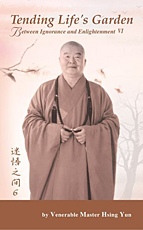Life is a garden and we must diligently and lovingly care for it with all the energy and creativity we can muster. Master Hsing Yun (Being Good, Keys to Living Well) teaches a brand of Humanistic Buddhism that is filled with practical wisdom. In this collection of talks, he covers a variety of subjects ranging from tests in life to self-entrapment to reforming ourselves to the treasure of great friendship. A common theme that threads its way through the book is transformation. Master Hsing Yun states:
"It does not matter how many unwholesome habits we have or mistakes we have made. As long as we are willing to repent and 'go through death,' we can save ourselves. For instance, if swearing at people is one of our bad habits, by being aware of our speech, we can change the way we speak. If we take control of our unwholesome acts, we can transform our behavior. Therefore, in the course of life, we should 'go through death' continuously, every day and every hour, in order to reform our bad ways. Then, we will not need to worry about our ability to succeed."
This illustrates in a vivid way how we are constantly moving from death to new life as we change our habits or alter our behavior.
One of the other themes that really appeals to us is the author's emphasis upon what he calls "life skills education." Many people in today's society are knowledgeable about intellectual matters but unable to practice kindness or courtesy in their daily lives. Yet it is in our interaction with others that we show our character. Master Hsing Yun also challenges us to develop poise, a word that is rarely used today. It is evident in the tennis players who shake hands after a match. Or as the author puts it,"poise is the result of cultivation, respect, and tolerance." A final way of getting at the same matter is Master Hsing Yun's ideas on "self-sculpting":
"However, the most important thing in life is sculpting ourselves. Whether we want to become a politician or a millionaire, in sculpting ourselves, it is of prime importance for us to create an unblemished, righteous character . . .
"Sculpting ourselves is a life-long mission. It takes decades of work and endless patience because every bit counts, whether it is tangible or intangible. We need to be elegant not only externally in poise and etiquette but also internally in our morals and cultivation before we can project a noble character and the brilliance of humanity . . .
"The British have traditionally wanted to sculpt themselves as ladies and gentlemen, the Americans as heroes, the Japanese as samurais, the Chinese as scholars, the French as romantics, and the Malaysians as hospitable people. Over the ages and kalpas, Buddhas and bodhisattvas all sculpted themselves as symbols of compassion and dignity."
Think about the model you have for this ongoing creative challenge. It is time for you to cultivate the inner qualities that will transform you into a new person of poise.
